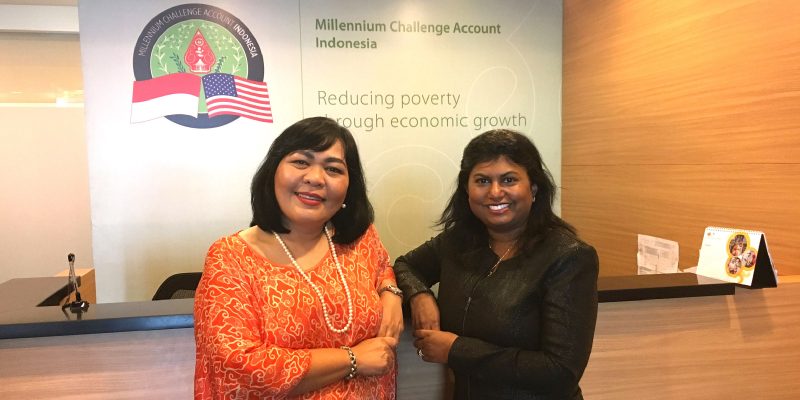Last month, I had the great pleasure to meet Bonaria Siahaan who heads the Millennium Challenge Account-Indonesia, the locally led and staffed entity implementing the MCC’s Indonesia Compact in the country’s bustling capital Jakarta. From procurement modernization to maternal and child nutrition to energy efficiency, Bonaria and her team are working on innovative projects making a real difference in a country where tens of millions of people are still struggling to rise out poverty.

Photo credit: MCC
Millennium Challenge Account-Indonesia CEO Bonaria Siahaan (left) and MCC Advisory Council Member Nilmini Rubin (right) pose at the Jakarta offices of the local entity implementing MCC’s Indonesia Compact. MCC-funded projects are engaging the private sector in the cocoa production and other industries to achieve better development results.
MCC’s Indonesia Compact is a wide-ranging investment that includes many different types of private sector participation. One illustration is a grant to two companies, Sky Energy and IKPT, to develop solar energy power plants that will be managed by the people of Karampuang in partnership with a private entity to benefit more than 3,000 people.
In addition to leveraging funds, the MCC compact is leading by example. A component of the compact supports partnership with the private sector that has resulted in a portfolio of sustainable cocoa production projects. These projects have brought together Indonesian banks, multinational cocoa companies, foundations, and local government to promote best practices among Indonesian cocoa farmers and raise their incomes. Given the global marketplace for cocoa, staying competitive means adhering to international best practices for everything from financial record keeping to environmental and social accountability throughout the supply chain.
“The partnership with the cocoa sector helps engage the private sector to adopt approaches that wouldn’t have been their priority,” Bonaria told me, helping private firms reach more farmers in new areas, increasing reach and impact. As such, the compact’s efforts have made the value of these approaches clear, leading to their integration into business models — which will benefit those who earn their livelihoods in Indonesia’s cocoa industry long after MCC’s Indonesia Compact ends in April.
Another MCC-Indonesia Compact project works to reduce child stunting by integrating sanitation, maternal and child health, and nutrition interventions at the community level. As people become more aware of the negative health effects of practices such as open defecation, families and communities are making healthier choices. As importantly, companies and local sanitation entrepreneurs are rising to meet the increased demand for affordable latrines and identifying future financial opportunities in the sanitation sector.
These three efforts go to the heart of what Bonaria told me: The private sector is increasingly seeing poor communities as potential markets instead of viewing them solely through the lens of social corporate responsibility. Growing economies like Indonesia provide great potential for companies to do well while doing good. I look forward to hearing from Bonaria about the compact closeout and how the Government of Indonesia, the private sector, and civil society are working together to take the opportunities created by the compact to the next level.
About the Author: Nilmini Rubin is the Vice President for International Development at Tetra Tech where she leads policy and engineering services for energy and internet infrastructure projects in developing countries.
Note: The opinion expressed herein is that of the author only, and should not be construed as an express or implied endorsement by MCC or the U.S. Government.

